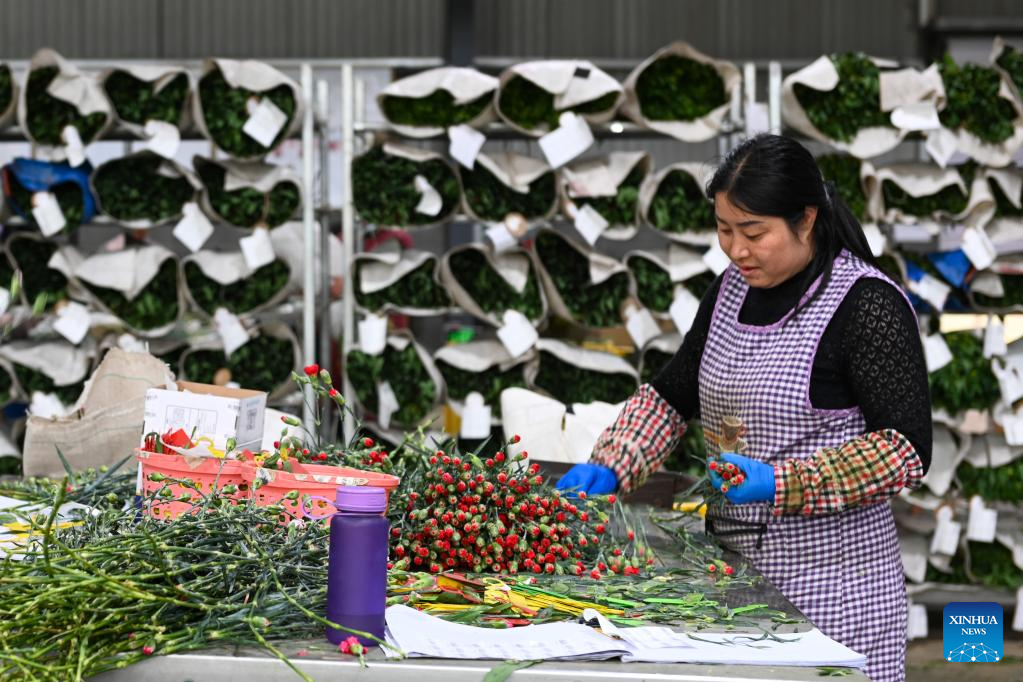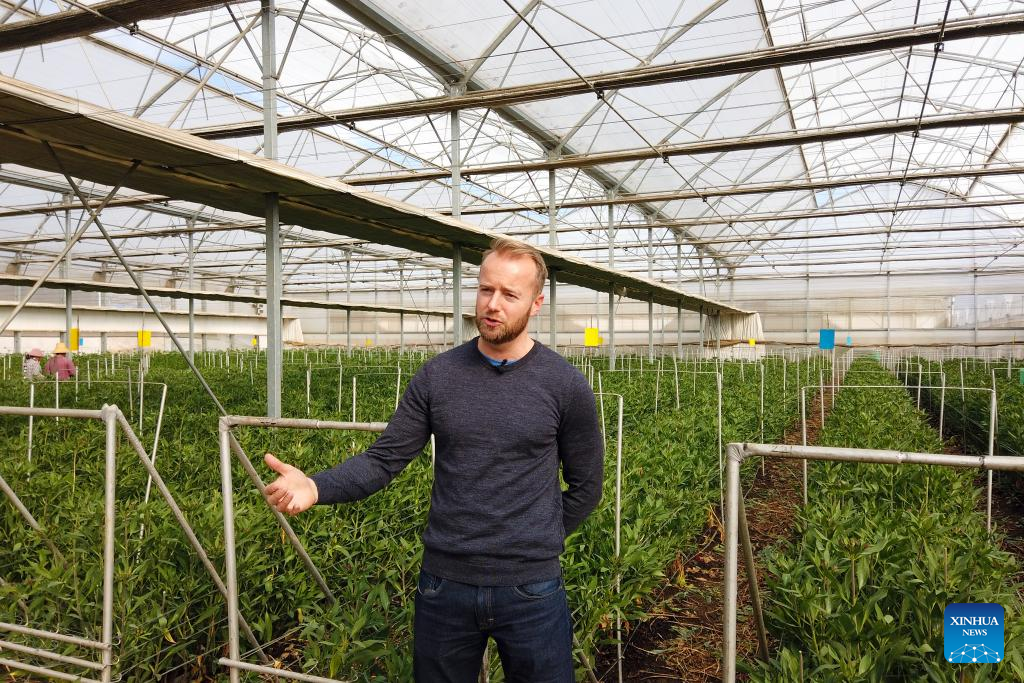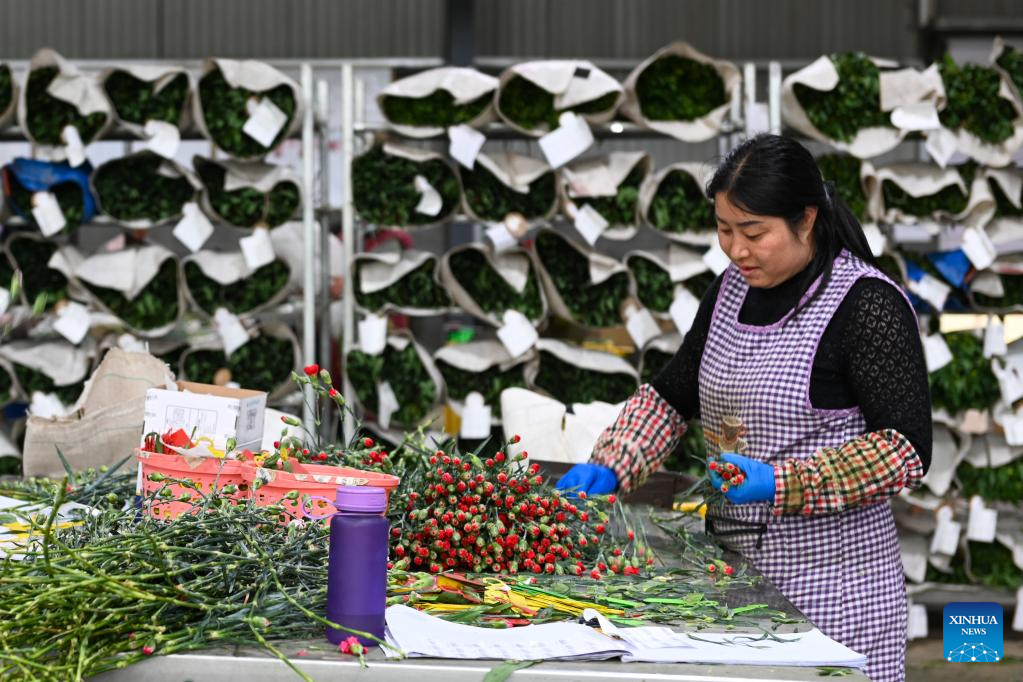
An employee works at a workshop of the Kunming Hasfarm Flowers company, in Kunming, southwest China's Yunnan Province, March 25, 2022.(Xinhua/Cao Mengyao)
By Xinhua writers Zheng Bofei, Cao Mengyao, Zhao Cailin
KUNMING, March 31 (Xinhua) -- When Tim Scalongne's plane touched down at the airport of southwest China's Yunnan Province in 2004, the Dutchman never thought this would be the start of his decades-long experience with floriculture.
Situated at a high altitude and low latitude, the province boasts long sunlight hours and good weather. It provides a pleasant environment for international business people, such as ones from the Netherlands -- the world's biggest fresh-cut flower producer -- to set up their flower farms.
Scalongne's first experience in Yunnan was nothing but traveling, and the investment in Yunnan's flower businesses was a trending topic for the Dutch residents.
At the start of the new millennium, the province took advantage of its location and environment and set up industrial flower parks and floral exchanges in Kunming. As a potential flower market, flower business people and botanists from countries, including the Netherlands, came to Yunnan for new opportunities.
"In my Dutch network, everybody was talking about investing in Kunming's flower business. That's when I decided to jump on the board," said Scalongne.
After receiving language training in Kunming, the provincial capital, Scalongne followed suit and joined one of the Dutch fresh-cut flower providers in Kunming to start his over-decade journey in this industry.
However, Scalongne realized that not many Chinese households were warm to buying high-end blooms produced by Dutch investors.
Export took the largest market share of Scalongne's company, whose flowers were for customers with high-quality demand in countries like Japan and Australia.
"A limited number of people at that time would buy quality flowers, and some of them bought flowers only for events and hotels," Scalongne said. "The market volume was small, but many Dutch believed China would have more high-end flower consumption once the country's middle class expanded."
The Chinese market did not fail the expectation of the Dutch managing director. After Scalongne got a new role as the managing director of another Dutch flower company, the Kunming Hasfarm, the Chinese market began to favor flowers with longer flowering times and more vibrant colors.
"It takes time for flower buyers to demand flower quality," said Wu Mingying, a long-time flower market regulator with the agricultural and rural affairs department of Yunnan.
"Gradually, you would see the increase in buying high-end products, which is also a microcosm of the whole Chinese market," Wu added.
According to the department, the flower planting area in Yunnan exceeded 1.9 million mu (about 126,667 hectares) in 2020. It was up 8.3 percent year on year, with the total output value from flower planting hitting 39 billion yuan (about 6.1 billion U.S. dollars).
In 2012, Scalongne's company had around 95 percent of its production exported to markets outside of China. But in 2022, over 70 percent is for Chinese customers.
"When you see households in China's coastal regions, especially people in their 20s or 30s, they are very interested in putting high-quality flowers in their homes to enrich their lives," Scalongne said.
The wait paid off in the end, and China's effort to combat poverty also yielded new opportunities for Scalongne's business.
"We would hire workers living in poor households with the government's encouragement," said Scalongne. "Reciprocally, those workers can also help us alleviate labor shortage."
To thank Scalongne's company, the local government awarded the company's farm in Yunnan's Qujing City the "model farm" for helping lift nearby villagers out of poverty.
Similar to other companies, Scalongne also faces challenges from increased labor costs, and one of the solutions is technology upgrading.
"In the future, China would see fewer plantations of low value-added flowers such as carnation like what we have seen in many countries," he commented. "But at the same time, we would see more flower breeders in China creating new varieties of flowers with higher yield and better quality."
This year marks the 50th anniversary of diplomatic relations between China and the Netherlands. The Netherlands has now become the second-largest trading partner of China in the European Union.
An official with the Dutch Foreign Ministry said that China's investment in research, talent, and knowledge infrastructure would offer Dutch companies and institutions many opportunities.
Sharing the same opinion, Scalongne believes that in this time of transition, the Chinese market would once again provide international businesses more opportunities. ■

Tim Scalongne is interviewed at the greenhouse of the Kunming Hasfarm Flowers company in Kunming, southwest China's Yunnan Province, March 25, 2022.(Xinhua/Zhao Cailin)




 A single purchase
A single purchase









